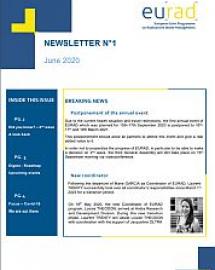Eurad publishes its first quarterly newsletter.

The European R&D project EURAD, coordinated by Andra, publishes its first newsletter. This newsletter, that will be released approximately quarterly, summarizes the news of the EURAD project.
You can find more on Eurad on its website: https://www.ejp-eurad.eu/
Click to download the first issue
If you want to receive the newsletters directly in your mailbox, please contact secretariat@ejp-eurad.eu
Eurad: provide safe and sustainable solutions for the management of radioactive waste
EURAD is a strategic European programme of joint research and scientific knowledge management activities on radioactive waste management. Its objective is to ensure the creation and preservation of cutting-edge knowledge to provide safe and sustainable solutions for the management of radioactive waste in Europe, now and in the future. This project, coordinated by Andra, brings together 104 European partners divided into 3 colleges: Waste Management Organisations (WMOs), Technical Support Organisations (TSOs), and Research Entities (RE).
The aim of Eurad is to implement a joint Strategic Programme of research and knowledge management activities at the European level, bringing together and complementing EU Member State programmes in order to ensure cutting-edge knowledge creation and preservation in view of delivering safe, sustainable and publicly acceptable solutions for the management of radioactive waste across Europe now and in the future.
EURAD shall support the implementation of the Waste Directive in EU Member-States, taking into account the various stages of advancement of national programmes. National RWM programmes across Europe cover a broad spectrum of stages of development and level of advancement, particularly with respect to their plans and national policy towards implementing geological disposal. Programmes differ significantly depending on the national waste inventory, with some member states only responsible for relatively small volumes of medical and research reactor wastes, compared to others that have comparatively large and /or complex waste inventories from large nuclear power (and fuel reprocessing) and defence programmes. Programmes also differ significantly in the way in which they are managed, particularly with respect to the national policy and socio-political landscape with respect to longer-term storage and geological disposal.

